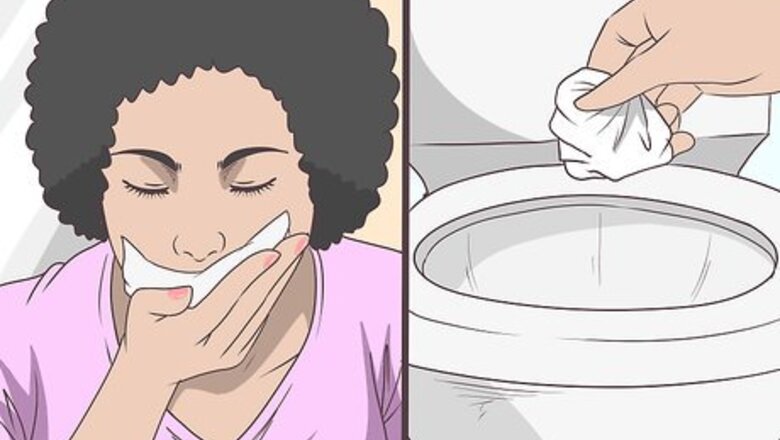
views
X
Trustworthy Source
Mayo Clinic
Educational website from one of the world's leading hospitals
Go to source
With this treatment, it's possible to contaminate others with radiation, even though the amount of radiation you're given is fairly small. For that reason, take precautions to clean up after yourself, particularly in the bathroom and the kitchen, and to isolate items you use from other household items. Talk to your doctor about how long to maintain this precaution period; typically, it's 3 to 7 days from your treatment.
- Flush the toilet twice after using it and wipe it thoroughly to properly get rid of radioactive fluids.
- Shower once a day to rinse away the leftover radioiodine, but make sure to scrub the shower well after using it.
- Wash your clothes and dishes separately from your family's so you don't contaminate their belongings.
Spit and dispose of used tissues in the toilet.

Your bodily fluids will shed radioactive material. When you use a tissue, put it in the toilet to flush. Similarly, when you brush your teeth, spit into the toilet bowl. On both occasions, flush the toilet twice after use. Disposing of them this way helps keep others safe.
Flush the toilet twice when you use the bathroom.
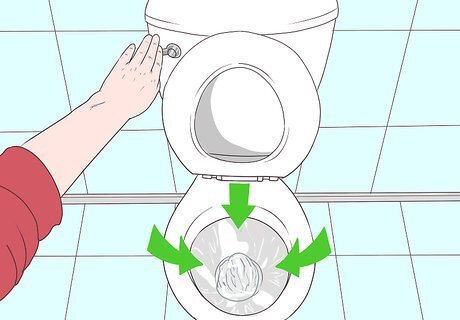
Flushing the toilet twice ensures the radioiodine goes down the drain. Put the lid down to flush. If you're a man, sit down to urinate so you don't splash.
Wipe down the toilet after using it.

Wipe any urine off the toilet seat after you go to the bathroom. If you spill urine or vomit, clean up the area with toilet paper and a household cleaner. With spills, always contact the radiation clinic to find out if you need to do more to clean them.
Clean your hands every time you use the bathroom.
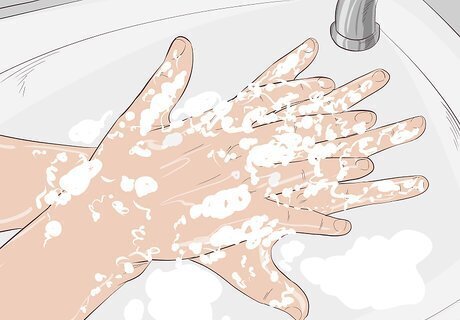
Scrub for at least 20 seconds before rinsing. After you go to the bathroom, soap up and scrub your hands thoroughly, as you'll be passing the most radioiodine in your urine. If you want to be sure you're washing long enough, try humming the "Happy Birthday" song while you scrub.
Shower once a day.

Showering helps wash away the radioiodine your body's shedding each day. However, skip baths, as you'd just be soaking in radioiodine. Plus, you're more likely to leave radioiodine behind in the bathtub.
Rinse the bathtub and sink after using them.

You will be sweating out radioiodine, as well as passing it in other bodily fluids. Use water to clean out the sink and tub after you use them to cut down on what you leave behind. A removable shower head works well for this purpose in the bathtub.
Wash your linens and clothes separately from the rest of the household.
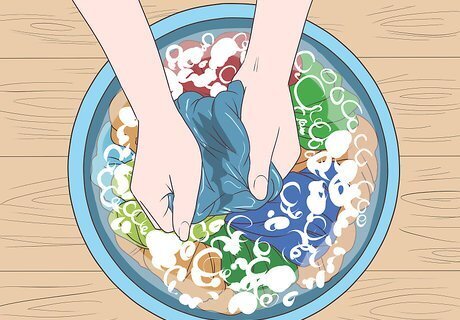
Your clothes may spread radioactive particles to other items in the house. Always wash your towels, sheets, and clothes in a different load from other household items.
Wash your dishes separately.
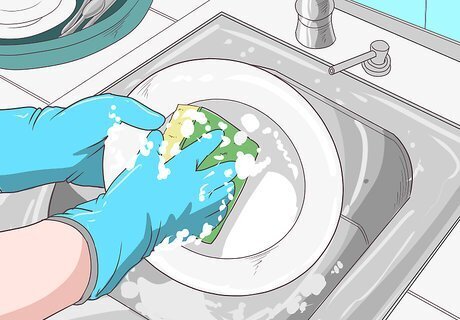
Reserve dishes and utensils for yourself that only you use. Keep your dishes away from other dishes and utensils. Also, wash these items separately from other household dishes so you don't spread radioactive particles to other items. You can use the dishwasher, as long as you're washing separate loads for your dishes. Alternatively, use disposable utensils.
Wipe down the phone after using it.

If you're using a shared phone, use a disinfectant wipe to clean it after each time you use it. Use a new one each time so you're not rubbing radioiodine back onto the phone. Wipe down any other shared items, such as the television remote.
Keep a towel, hand towel, and washcloth for your use only.

Don't share with anyone else, as you can spread radioactive particles to them. In fact, it's best to designate a separate bathroom for yourself during this time, if at all possible. Don't share hand towels in the kitchen, either.
Sleep by yourself.

Even being near a person can transfer radiation from you to them. Avoid contact with other people as much as possible. Sleep in a bedroom by yourself, and don't let anyone else use the bed even when you're not in it.
Maintain distance from other people.
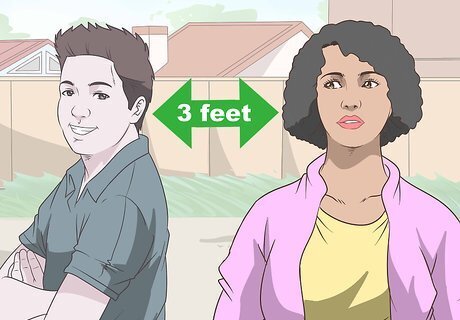
Stay at least 3 feet (0.91 m) away from other people at all times. They should only come closer for very short periods, such as a minute or two if it's absolutely necessary. Staying 6 feet (1.8 m) or farther away is even better, particularly with children and pregnant women. It's best to be in a different house away from children and pregnant women if at all possible. In fact, avoiding contact with pregnant women for 20 days is best, while you shouldn't get closer than 6 feet (1.8 m) to a child in the first 3 days. Limit car rides with other people. If you need a driver, sit in the back seat in the opposite corner from the driver.
Avoid staying in a hotel.
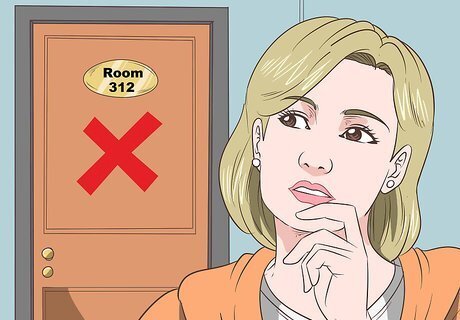
You could put other guests at risk when the staff cleans your room. Staying in a hotel puts others, such as the cleaning staff, at risk since they do not know they are handling radioactive material. They will also wash the linens with the other guest linens, potentially putting other guests at risk, too. If you need to separate yourself, have other household members stay in a hotel instead.
Wash your linens and clothes twice by themselves.
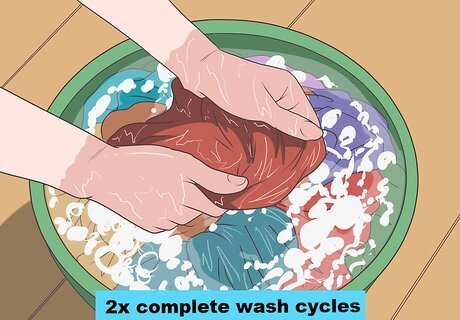
Once your precaution time is over, put your linens through 2 complete wash cycles. After that, anyone can use them again. Also, wash your clothes twice before wearing them again. The process of washing your clothes twice helps remove the radioactive particles.
Clean the bathroom thoroughly.

After your precaution period is up, wipe down the bathroom with disinfecting wipes. Wear gloves for the process, and then place the wipes and gloves in a designated trash bag.
Place all contaminated disposable items in a separate trash bag.

The facility where you have your treatment may give you a special bag for trash. Anything you use that's disposable, such as food plates, utensils, non-flushable cleaning wipes, and gloves, should be placed in that bag. The bag should be leak-proof. You should be able to close it tightly. Keep the bag out of reach of any pets or children. Also, separate it from the other trash bags in the house. Often, you will be asked to return your trash bag with the trash in it back to the facility. In some cases, though, you may be asked to wait 3 months and then throw it away normally. The bag you were given should have a tight seal to keep it from smelling. If it starts to smell, call your local hazardous waste disposal to see if they will take it.

















Comments
0 comment